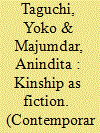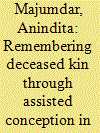|
|
|
Sort Order |
|
|
|
Items / Page
|
|
|
|
|
|
|
| Srl | Item |
| 1 |
ID:
143548


|
|
|
|
|
| Summary/Abstract |
Every year, large numbers of aspiring parents from all over the world come to India to fulfil their dreams of parenthood. They hire an Indian surrogate and with the help of state-of-the-art medical technology, they are able to conceive children they can call their ‘own’. Since 2005, commercial gestational surrogacy in India has become a lucrative industry thanks to the cheap gestational labour, and cheaper medical services. However, this largely unregulated industry is facing roadblocks in international bureaucratic processes. The child born from the arrangement is often caught between conflicting international laws and deemed ‘stateless’. I wish to look at how the state and international laws tend to define persons and relationships by regulating entry and exit, especially through verification and authentication of kin. The world of transparent and visible boundaries – and their policing – is seen through the transnational processes of identifying the stateless children born through the arrangement.
|
|
|
|
|
|
|
|
|
|
|
|
|
|
|
|
| 2 |
ID:
178513


|
|
|
|
|
| Summary/Abstract |
This special issue brings together emerging studies on kinship in South Asia and explores the idea of kinship as ‘fiction’ through ethnographic analysis of intimate relationships. Anthropology had long considered kinship as ‘natural’ or ‘biological’, thereby rendering other relations as ‘real’ or ‘fictive’. However, the recent ever-expanding scope of the ‘new kinship studies’, through the mapping of socio-technological changes, including the development of new reproductive technologies, the expansion of a diverse marriage system, and the global reconfiguration of care work, has brought a new dynamism to the discipline. Drawing both on traditional South Asian kinship studies and on more recent theories in anthropology, care work, medicine and science and technology studies, Kinship as Fiction offers insights on how ‘nature’ and ‘culture’ are related, translated, and regenerate each other by changing their meanings and forms. Fiction plays an important role in shaping reality, by making emerging worlds comprehensible, and helping us to imagine relations differently. This special issue investigates how particular ‘fictions’ are narrated and enacted within the constraints of reality, and how reality is, in turn, generated by fiction in the context of kin and other intimate relationships.
|
|
|
|
|
|
|
|
|
|
|
|
|
|
|
|
| 3 |
ID:
178515


|
|
|
|
|
| Summary/Abstract |
In this paper, I examine the idea of fiction in relation to kinship by analyzing the role that memory plays in assisted reproduction in North India. I specifically engage with the desire to seek the intervention of in-vitro fertilization after the loss of a child, mostly sons, through an accident, prematurely. In the process, the paper engages with the kind of narratives that birthing women remember and speak of in seeking the ‘rebirth’ of their dead sons, and what this means for kinship per se. This is especially important in relation to the conflicts and ambivalence that mark intimate relationships; and the ways in which the IVF clinic and clinician seek to reimagine them in facilitating assisted conception. I suggest that the narratives surrounding these rebirths act as effective and powerful messages for normalizing IVF, and also to hide other forms of relatedness that come to mark conflicting, ambivalent and yet, deeply intimate relationships.
|
|
|
|
|
|
|
|
|
|
|
|
|
|
|
|
|
|
|
|
|